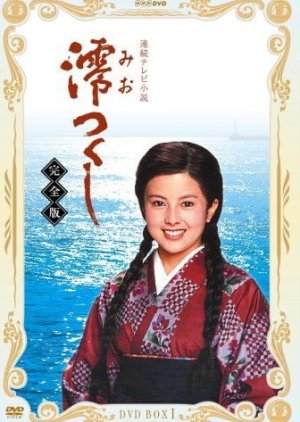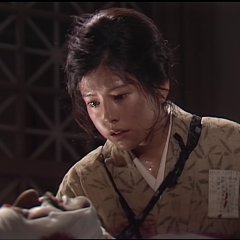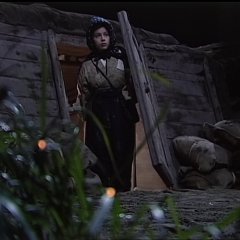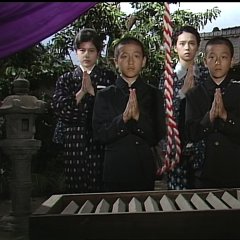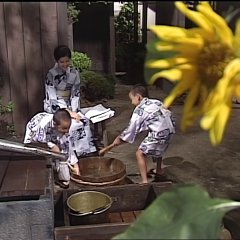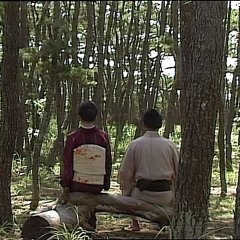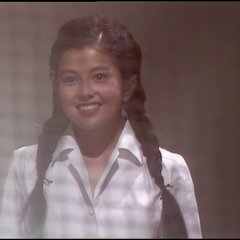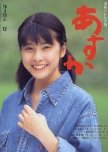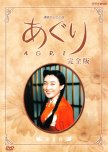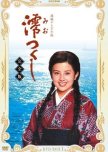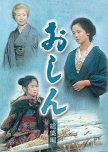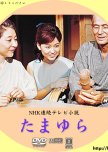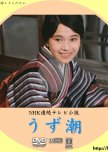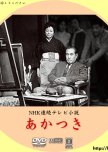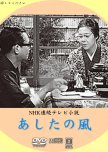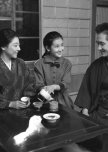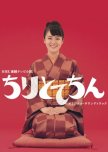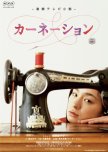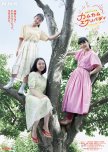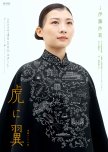The 34th NHK Asadora drama is Mio Tsukushi. Locations include Choshi-shi, Chiba. The courageous and steadfast heroine of this popular serial drama, set in a port city in 1920s Japan, defies tradition to marry the man she loves. When he is lost at sea, she becomes the support of her family and others. Edit Translation
- English
- magyar / magyar nyelv
- dansk
- Norsk
- Native Title: 澪つくし
- Also Known As: Miotsukushi , The Calm Amid the Storm , The Channel Marker
- Screenwriter: James Miki
- Director: Mayuzumi Rintaro
- Genres: Historical, Romance, Life, Drama
Cast & Credits
- Sawaguchi Yasuko Main Role
- Kawano Taro Main Role
- Kaga MarikoFurukawa RuiSupport Role
- Yamashita KisukeKoinuma EijiSupport Role
- Kato ZenpakuImanishiSupport Role
- Ikuta TomokoYoshitake MasumiSupport Role
Reviews

This review may contain spoilers
"Love is a dangerous visitor."
"Mio Tsukushi" is my 21st asadora that I've completed. I started watching it right after the English subtitles were completed over at d-addicts. I really appreciate fansubbers who decide to pick up older asadoras like this one. "Mio Tsukushi" was originally released in 1985 and had very high ratings at the time (next to the very popular "Oshin"). 80s asadoras are similar to modern ones in many ways, though I've noticed that they tend to rely on suspense more often. For example, nearly every episode and especially the last episodes of each week end on a cliff hanger. For this reason, I found myself saying "Just one more episode..." time after time (lol). P. S. Major spoilers follow so stop reading here if you don't want to know anything else!The main theme of "Mio Tsukushi" is love and how it effects not just the lovers but those around them. Sawaguchi Yasuko plays the heroine, Kaoru, in her lead debut. Considering she was a relatively new talent at the time, I was very impressed with her performance. Kaoru is the daughter of a soy shop owner and his mistress. She falls in love with fisherman Yoshitake Sokichi (played by Kawano Taro) at the very beginning of the drama. Unfortunately, fisherman and soy shop workers are like water and oil. Furthermore, her father has finally accepted Kaoru into the family register and will not approve of Sokichi. Kaoru tries to forget about Sokichi at first, but their feelings only grow stronger. This section of the drama is my favorite as we watch their relationship develop and the general conflict that arises from those around them. It has a satisfying conclusion as well with Kaoru, despite being disowned, triumphantly marrying Sokichi as the asadora's insert song plays.
The actual part of Kaoru and Sokichi's marriage is less entertaining in my opinion. The question of whether they were going to get married was better than the reality I guess (lol). Now don't get me wrong, there are still some cute moments between the couple. I especially liked their trip to Itako, which gets referenced several times later on. Their romance is cut short when Sokichi goes missing during a storm. After about two years, Kaoru's parents encourage her to remarry. Her new match is Umeki Kensaku (Shibata Kyohei), the head clerk of her father's shop. I really liked Umeki's earnest love and I think it's easy to see why Kaoru would choose to marry him. His jealousy when Sokichi returns alive is also completely understandable. Ultimately, I think both men were good matches for Kaoru though first loves are obviously harder to get over.
Kaoru is, of course, the main character but this asadora sometimes feels more like an ensemble. Many characters are given story arcs away from Kaoru. Of these characters my favorite was hands down Ritsuko (Sakurada Junko), Kaoru's half-sister. Her personality is slowly uncovered and developed over the course of the drama. The ending of her character is pretty sad, but I think fits the tone of the final week. Other great characters are Kaoru's parents, Rui (Kaga Mariko) and Kyubei (Tsugawa Masahiko), her brother Eiichiro (Washu Isao), and mother-in-law Tone (Kusabue Mitsuko). The maid, Ami (Takashi Miyuki), also has a nice, heartbreaking arc. I was really surprised that the writer took the time to complete Ami's arc. The only character I really didn't like was Yataro (Akashiya Sanma). He was supposed to be comic relief, but I really only wanted to slap him.
I'm not knocking off any points for the music. It has a simple melody for the opening, which can get repetitive after hearing 162 times (I'm lazy or I would've skipped it lol). It also has an insert that is played a few times of the course of the asadora. I really liked this one, and I think the tune and lyrics really fit Kaoru as a character.
"Mio Tsukushi" is another asadora I'd recommend. It has strong characters and strong love stories. The final two weeks are hard to get through, but that's expected since it's covering WWII. I liked the open-ended ending to be honest, though I acknowledge that it's not for everyone. It leaves it up to me to imagine what ultimately happens between Kaoru and Sokichi, and I think that's fun.
Was this review helpful to you?

This review may contain spoilers
Twists and turns of fate make life unpredictable.
I was interested in watching Miotsukushi after seeing a GIF of the heroine on a boat. Without looking deeper into the story, I immediately jumped in, and I have no regrets, because this is truly a masterpiece.Miotsukushi is my 19th Asadora, and it ranks in my top 3 most rollercoaster-like Asadoras. The twists of fate shape the heroine’s journey. It has the most unpredictable plot I’ve seen, and it feels like every possible conflict of that era is packed into Miotsukushi.
After watching it, my heart feels tight, the story is beautiful, but it leaves a bittersweet taste. Especially since it ends just as the Japanese war era concludes, around 1945–1946. But in a way, that’s what makes the ending so powerful: it feels full of hope, open to countless dreams.
♡ THINGS I LIKE:
1. The Heroine.
Kaoru is a character who truly fits the era she lives in, she feels like the embodiment of the ideal young woman of that time. She’s timid, shy but kind, sincere, polite, honest. At the same time, she has a love for literature and is athletic. What I especially love about her is that she’s also brave and always expresses her feelings and thoughts. She takes full responsibility for her choices. I really adore her character.
2.The Heroine’s Family.
Even though her family situation is complicated, since Kaoru was born to a concubine, Miotsukushi portrays it beautifully. I love the harmony within the Bando family. Her father is strict but deeply loves his family and tries his best to be fair. The official wife is a woman with a gentle heart, yet open-minded for the sake of the family. Kaoru’s mother is sincere and devoted to her husband and the family. Her older sister has a strong will but clearly cares for her family. And my favorite character is Kaoru’s younger brother, Eiichiro, he is Kaoru’s support system, accepting her from the very beginning, always there for her, and protective. I really loved it when he said “To me, both are onee-san.”
3. The Two Love Interests.
Honestly, both of them have their flaws, but they each have beautiful qualities in their own way. Soukichi is full of charisma, the first love and clearly Kaoru’s endgame. Umeki is sincere and patiently waits for Kaoru for years. It’s both touching and painful to see how fate twists the happiness of Kaoru, Soukichi, and Umeki.
4. I like the development of Kaoru's character.
She started out as a timid young girl. After getting married, she became a pillar of the Yoshitake family. When she lost her husband and returned to the Bando family, Kaoru changed. She found her passion in soy sauce making and showed incredible creativity in marketing her products. Eventually, she became a director at Iricho. And when the war began to intensify, Kaoru became the key figure in reviving the family’s legacy business, Iricho.
5. I learned so many new things.
From the soy sauce-making process, to the passion of the fishermen and how deeply rooted their trust is with terms like Kuro-fujyo, Maiwai (the finest fisherman's clothing). This was also the first time I saw a weapon of war depicted in an Asadora. I also learned about Senninbari, and even the meaning behind the word Miotsukushi. There’s still so much more!
6. The resolution of the conflict between the land and the sea people.
From the very beginning, there was constant tension between the soy sauce shop and the seashore fishermen, Iricho vs. Yoshitake always at odds like oil and water. But Kaoru and Soukichi overcame all of it. Kaoru was the biggest reason they were able to reconcile, eventually uniting and supporting each other through the war. I especially loved how the Yoshitake family helped take care of Kaoru’s twins during the war. And one of the most touching scenes was on Iricho’s 300th anniversary, when the Yoshitake fishermen came to congratulate them and bring gifts. That scene was incredibly meaningful and beautiful.
7. The Ending.
One of the things I like about the ending is when Soukichi proposes to Kaoru at Umeki's grave. Even though Kaoru rejects him because she wants to rebuild Iricho, Soukichi doesn’t give up on her, even after waiting 21 years and Kaoru also realizes that she still(always) loves him.
♡ THINGS I DIDN'T LIKE:
1. The politics.
I understand that Miotsukushi is set during wartime, so political themes are inevitable. But out of all the wartime Asadoras I’ve watched, the political elements in this one run much deeper. The part I disliked the most was when activists came to Iricho and how Kaoru’s sister involved her in it.
2. Soukichi slapping Kaoru in episode 80.
I didn’t cry through most of the episodes, until this scene. All of Soukichi’s sweetness and gentleness vanished in that moment. how he turned his back coldly on Kaoru, how he refused to be honest with her, and how he placed her between the Bando and Yoshitake families. Kaoru had to sacrifice her own happiness. And all because of politics. Yes, I really hated the politics in Miotsukushi.
3. Umeki’s inferiority.
I also didn’t like the scene where Umeki’s inferiority complex surfaced, he became cowardly, got drunk, and was rude to Kaoru, saying so many hurtful things, even though he’s usually kind and caring. Both love interests have their flaws, but I’m thankful they both returned to their better selves later on.
4. Kaoru’s motherhood isn’t shown enough.
It’s a shame that Kaoru’s motherly side isn’t explored more. There are only a few scenes of her with her children. Those scenes really add life to both her character and her children, and I wish there were more of them.
Overall, even though it’s not my favorite, I still really like Miotsukushi!
The core of Miotsukushi is Kaoru’s journey through the many twists of fate in her life. Miotsukushi covers everything: family relationships, romance, struggles during the war, the effort to keep soy sauce production alive, fishermen and their beliefs, politics, and so much more.
This is the most complex Asadora I’ve ever watched and the one with the sweetest romance scenes. My favorite part is how Kaoru and Soukichi’s relationship begins. I highly recommend Miotsukushi if you enjoy complex, emotionally rich stories! It’s an Asadora that will always hold a special place in the depths of my heart ♡
Was this review helpful to you?
Recommendations
There have been no recommendations submitted. Be the first and add one.

